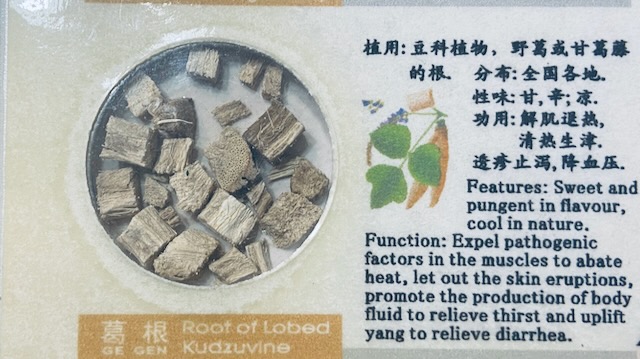
If you’ve ever been to the Southern States you’ve probably seen kudzu. This vine, native to Japan and southern China was introduced into the United States and has grown like crazy in the southern states from the Carolinas on the coast to Texas. It has sometimes been called, “the vine that ate the south,” because it now covers millions of acres, growing over the top of everything, and costs hundreds of millions of dollars to control. I believe we should be utilizing plants like this a lot more than we do because they are not endangered in any way, and harvesting them will help, not hurt, the environment.
Kudzu is used as both a food and a medicine. The leaves may be eaten raw or cooked and the starch from the roots is used as a thickening agent. Kudzu can also be used to make noodles. But, right now I'm more interested in kudzu's medicinal uses.
Kudzu for the Heart
 Heart disease is still the leading cause of death in the Western world, so it’s good to know that this plentiful plant can be helpful for the heart and circulation. It can help to reduce both systolic and diastolic blood pressure and improve blood flow in people with arteriosclerosis. It also has antithrombotic activity, which means it can inhibit the formation of blood clots to prevent thrombosis. It also reduces the viscosity (or thickness) of the blood to aid blood flow. It also acts as a cardiac tonic helping improve oxygen utilization by the heart.
Heart disease is still the leading cause of death in the Western world, so it’s good to know that this plentiful plant can be helpful for the heart and circulation. It can help to reduce both systolic and diastolic blood pressure and improve blood flow in people with arteriosclerosis. It also has antithrombotic activity, which means it can inhibit the formation of blood clots to prevent thrombosis. It also reduces the viscosity (or thickness) of the blood to aid blood flow. It also acts as a cardiac tonic helping improve oxygen utilization by the heart.
It can be used in combination with hawthorn as a gentle cardiac tonic to improve heart health, relieve angina, and help rebuild the heart in congestive heart failure. It has also been shown to reduce headaches, tinnitus, and vertigo in people with hypertension.
Kudzu for the GI Tract
 Kudzu also has some benefits for the gastrointestinal (GI) tract. It has a soothing and toning effect on digestive membranes and may be helpful for irritable bowel syndrome, leaky gut syndrome, colitis with mucus, and diarrhea. It works best for these issues in combination with other herbs. David Winston recommends combining it with wild yam, yarrow, sarsaparilla, and chamomile for GI tract issues.
Kudzu also has some benefits for the gastrointestinal (GI) tract. It has a soothing and toning effect on digestive membranes and may be helpful for irritable bowel syndrome, leaky gut syndrome, colitis with mucus, and diarrhea. It works best for these issues in combination with other herbs. David Winston recommends combining it with wild yam, yarrow, sarsaparilla, and chamomile for GI tract issues.
Also, my good friend, Kimberly Balas, ND, found a combination of kudzu and St. John’s wort could be helpful for leaky gut. St. John’s wort helps the vagus nerve that regulates the gut-brain axis and kudzu acts as a soothing intestinal agent like marshmallow. So, I think these two herbs could be very helpful for toning up the intestines.
Antispasmodic Action
 In TCM, kudzu root is considered acrid and cooling. Known as Ge Gen, it is said to affect the stomach and spleen. One of its primary uses is for relieving wind-heat which manifests as headache, fever, stiffness, and pain in the neck and shoulders. It’s helpful for fever with associated thirst and dry mouth. I’ve seen it helpful for people with intestinal problems who also suffer from a stiff neck with accompanying headaches. This includes migraines.
In TCM, kudzu root is considered acrid and cooling. Known as Ge Gen, it is said to affect the stomach and spleen. One of its primary uses is for relieving wind-heat which manifests as headache, fever, stiffness, and pain in the neck and shoulders. It’s helpful for fever with associated thirst and dry mouth. I’ve seen it helpful for people with intestinal problems who also suffer from a stiff neck with accompanying headaches. This includes migraines.
An interesting point here is that there seems to be a link between GI problems and neck pain. I first observed this when I was muscle testing a client and they had wobbly muscles. Their muscles wouldn't lock into place, but quivered instead. This was a sign of ileocecal valve problems. The ileocecal valve is the valve between the small and large intestines and when it doesn’t close properly, microbes from the colon migrate into the small intestines causing dysbiosis, gas, bloating, and also leaky gut. Besides massaging the area around the ileocecal valve itself to correct this problem, I also learned to massage the right side of the neck, which helped reset the valve so the person could be muscle tested effectively. I’ve since observed, on myself at least, that when my neck is stiff I often have problems with my small intestine and ileocecal valve, which when corrected, ease the pain in my neck.
Other Kudzu Uses
 There has been some interesting research suggesting that kudzu can be helpful for alcoholics. It appears to reduce cravings for alcohol. The two compounds that appear to be responsible for this are the isoflavonoids daidzin and daidzein. An extract that is standardized for these compounds would be best for this purpose.
There has been some interesting research suggesting that kudzu can be helpful for alcoholics. It appears to reduce cravings for alcohol. The two compounds that appear to be responsible for this are the isoflavonoids daidzin and daidzein. An extract that is standardized for these compounds would be best for this purpose.
Kudzu has also been used topically to help heal wounds, burns, and insect bites. It can be applied topically as a poultice. You can also use the extract in a compress. It is also used in TCM to aid measles and ease thirst.
Using Kudzu
The Chinese recommend a dose of about 10 grams of kudzu daily, which would be twenty 500 mg capsules a day. In China, standardized root extracts (10 mg tablet is equivalent to 1.5 grams of the crude root) are used to treat angina pectoris. The dose for capsules of a 4:1 extract is two 500 mg capsules three times a day. You can also take a 1:5 tincture. The dose for the tincture is 40-80 drops four times a day.
Steven's Articles
-

-
The Uplifting Fragrance of Jasmine
Jasmine lifts depression, aids self-confidence,…
February
-

-
Reishi (Ganoderma) Mushroom
A TCM remedy for calming the shen (spirit), balancing…
-

-
Eucommia Bark
A superior tonic that promotes kidney, structural,…
January
-

-
Goldenthread, Phellodendron, and Yellow Root
Three herbal remedies containing the infection-fighting…
-

-
Teasel
A traditional herb for healing bones and joints…
-

-
Barberry and Healthy Personal Boundaries
A thorny shrub for fighting infections and supporting…
December
-

-
The Evidence for Berberine
A yellow alkaloid found in traditional infection-fighting…
-

-
The Sensible Use of Caffeinated Herbs
Kola nuts, guarana, and yerba mate and other herbs…
-

-
The Health Benefits and Problems with Coffee
This popular caffeinated beverage can be beneficial…
October
-

-
Understanding Caffeine & Cellular Adaptation
Preserving the power of caffeine's buzz and the…
September
-

-
Horseradish
A pungent spice for aiding protein metabolism…
-

-
Banaba or Crepe Myrtle
A beautiful tree from Southeast Asia whose leaves…
August
-

-
Monkeyflowers
Flower essences to help see ourselves more clearly…
-

-
Mariposa Lilies
Strengthening the bond between mother and child…
-

-
The Noble Bay Leaf
A common kitchen herb for aiding digestion and…

